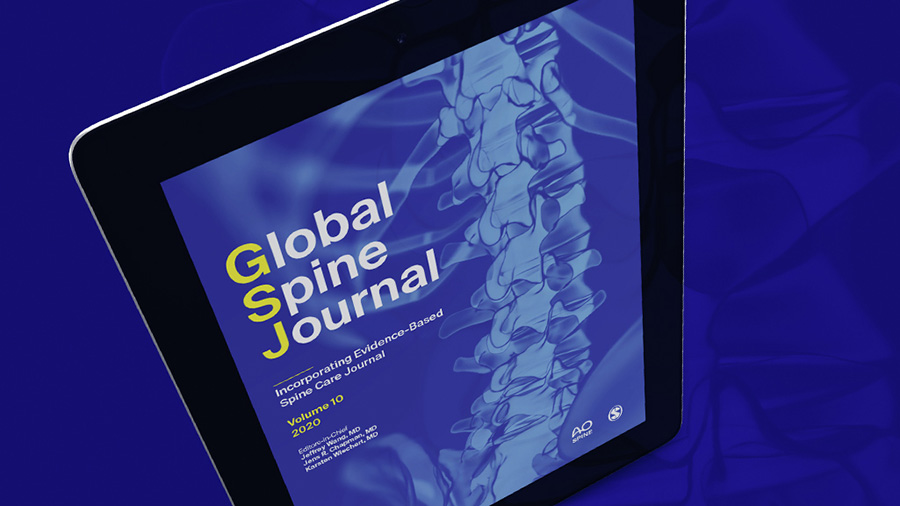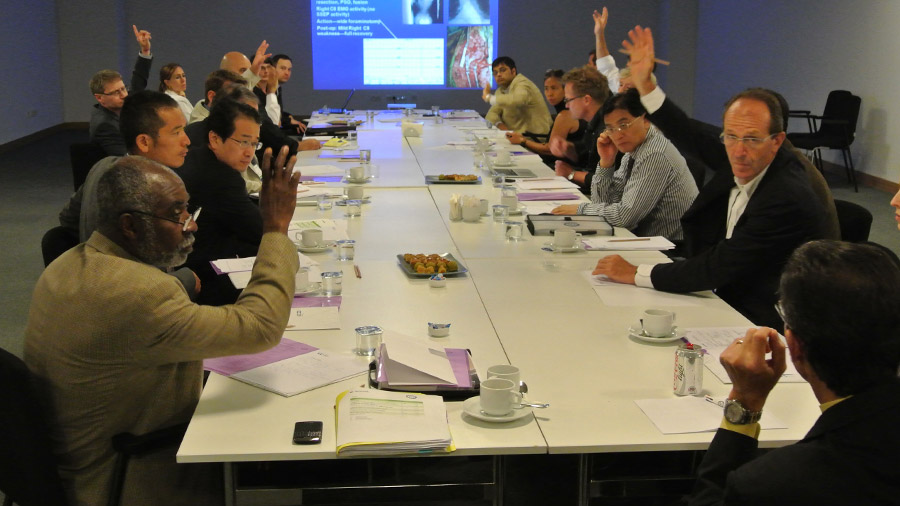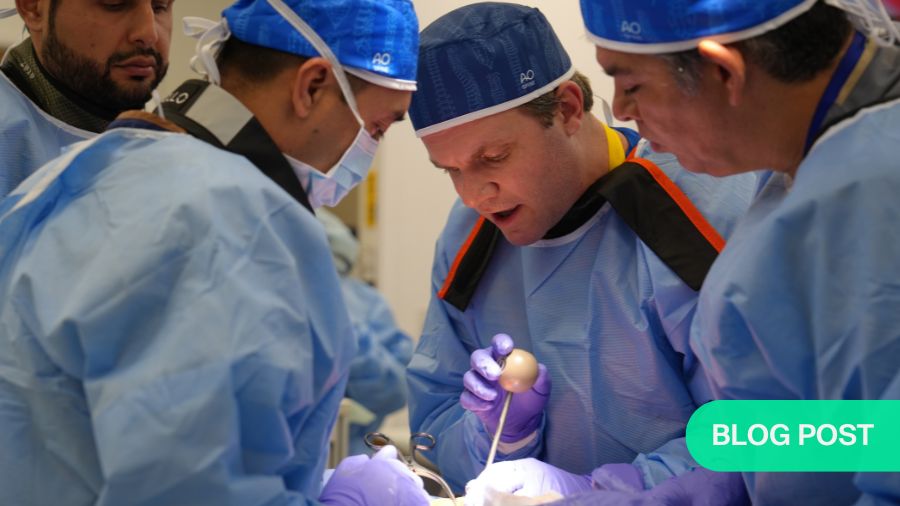Latin America research study groups

AO Spine Latin America is dedicated to advancing patient care through cutting-edge research and collaborative efforts. As part of AO Spine’s mission to promote excellence in the treatment of spinal pathologies, AO Spine Latin America launched regional Study Groups and a range of research support opportunities, including technical assistance and funding.
The experienced spine surgeons and experts involved in regional research focus on developing innovative solutions to address key clinical challenges in spine care.
Research study groups are regional networks of experts
The Latin America Study Groups comprise a network of experienced, dedicated, and well-trained spine surgeons who collaborate on research in five main areas: Degenerative, Minimally Invasive Spine Surgery (MISS), Pediatric Spine, Trauma, and Tumors.
Members and associates of each Study Group meet regularly to discuss new and ongoing research projects, working together to develop studies that address critical clinical and scientific challenges.
AO supports every step of study
AO Spine Latin America provides research support, offering researchers the opportunity to request assistance at various stages of their studies. This support includes technical and network assistance, as well as funding for essential scientific services.
- These services may include statistical consulting and analysis, translation services, scientific illustrations, publication fees, materials for experimental research, and other critical needs relevant to the proposed study.
- Approved funding is managed by the AO Spine regional office, with payments for services or products made directly to suppliers. No funds are transferred to the Principal Investigator or their institution.
To request research support, the Principal Investigator must submit a proposal.
Participation in the Study Groups and access to research support are exclusive benefits for AO Spine members. For more information, contact us by email.
Currently active Latin America research study groups
The regional study groups aim to advance knowledge and focus on understanding the complexities of selected spinal conditions to improve patient outcomes, taking into account regional considerations that otherwise are sometimes overlooked. The findings are disseminated through scientific journals, congresses, and events.
Discover the research outcomes published by the Degenerative, Minimally Invasive, Pediatric, Trauma, and Tumor Study Groups, and the members who make it happen.
Study Group Degenerative
Focused on understanding and addressing the complexities of degenerative spine conditions, this group explores innovative treatments and surgical techniques to improve patient outcomes.
Coordinator: Emiliano Vialle (Brazil)
Members: Bruno Saciloto (Brazil), Carlos Roberto Massella Jr (Brazil), Gonzalo Kido (Argentina), Jose Rafael Dangond (Colombia), Marcelo Molina Salinas (Chile), Felipe Aguilar Chavez (Chile), Sofía Beltrame (Argentina)
-
Publications
2024
Avaliação da diferença entre LL ortostática e em decúbito (DELTA LORDOSE) como preditor de rigidez da coluna lombar. Revista Coluna/Columna
Analysis of Predictors for Spinal Fusion in Degenerative Lumbar Stenosis in Chile Based on Diagnosis-Related Groups. Archives of Epidemiology
RECOSAN Tumors Study: Analysis of Patients with Spine Surgery due to Oncologic Pathology. Journal of Surgery and Research
Navigation experience in Latin-American Spine Surgeons: A survey. Cureus
2023
Surgical delay in adolescent idiopathic scoliosis in Latin America. How long it takes? World Neurosurgery
Spinal injection Survey among spine surgeons in Latin America. Journal of Spine Research and Surgery
Posterior Hemivertebrectomy for Correction of Congenital Kyphosis in Adulthood. Case Report and Literature Review. Annals of Case Reports
Low-grade cartilaginous neoplasm: a rare cause of paraparesis. Annals of Case Reports
Radiological classification for degenerative lumbar spinal disease: a literature review of the main systems. Journal of Spine Research and Surgery
2022
An inter- and intra-rater agreement assessment of a novel classification of pyogenic spinal infections. European Spine Journal
2021
Unplanned Readmission Following Early Postoperative Complications After Fusion Surgery in Adult Spine Deformity: A Multicentric Study. Global Spine Journal
An independent inter- and intra-observer agreement assessment of the Eno classification of sacroiliac joint degeneration. Acta Radiologica
Reporting Complications in Spinal Surgery – a Systematic Literature Review. World Neurosurgery
Quality Assessment for Reporting Complications and Adverse Events in Spinal Surgery: A Proposed 5-Item Checklist. World Neurosurgery
Study Group MISS
Dedicated to advancing knowledge in the field of Minimally Invasive Spine Surgery (MISS), this group explores innovative surgical techniques and technologies designed to enhance patient well-being and improve surgical outcomes.
Coordinator: Cristiano Menezes (Brazil)
Members: Alberto Gotfryd (Brazil), Alexandry Carvalho (Brazil), Alfredo Guiroy (Argentina), Cristian Correa (Chile), Facundo Van Isseldyk, Jefferson Soares Leal (Brazil), Jeronimo Milano (Brazil), Matias Pereira Duarte (Argentina), Henrique Cortat Proba Couri (Brazil)
-
Publications
2024
Perception of the learning curve for endoscopic spine procedures, a survey of spinal surgeons in Latam. Revista Coluna/Columna
Spinal Injections by Spine Surgeons: Current situation in Latin America. World Neurosurgery
10 tips for the placement of fenestrated pedicle screws with cement augmentation. Neurosurgery Practice
Endoscopic treatment of lumbar degenerative disc disease: a narrative review of Full-Endoscopic and Unilateral Biportal Endoscopic Spine Surgery. World Neurosurgery
2022
¿Porqué los Índices de Fragilidad no son usados de manera sistemática en la consulta preoperatoria de Cirugía de Columna Vertebral? Revista de la Facultad de Ciencias Médicas de Córdoba
Is indirect decompression and fusion more effective than direct decompression and fusion for treating degenerative lumbar spinal stenosis with instability? A systematic review and metanalysis. Global Spine Journal
2021
20 tips to avoid and handle problems in the placement of percutaneous pedicle screws. World Neurosurgery
Study Group Pediatric Spine
Established in 2024, this is the most recent Study Group, composed of experts specialized in the diagnosis, treatment, and management of spinal conditions in children, focusing on providing the best possible care and ensuring optimal outcomes for young patients.
Coordinator: André Luís Fernandes Andújar (Brazil)
Members: André Moreira Castilho (Brazil), Denis Seguchi Sakai (Brazil), Fernando Alvarado (Colombia), Jefferson Soares Leal (Brazil), Jorge Parra (Ecuador), Karen Weissman (Chile), Luis Eduardo Munhoz da Rocha (Brazil), Mauricio Montalvo Galindo (Mexico), Rodrigo German Remondino (Argentina), Samuel Pantoja (Chile), Túlio Rangel (Brazil)
Study Group Trauma
Focused on the latest advancements in spinal trauma management, this group aims to improve outcomes for patients with traumatic spinal injuries through research and knowledge exchange.
Coordinator: Charles André Carazzo (Brazil)
Members: Alfredo Guiroy (Argentina), Andrei Fernandes Joaquim (Brazil), Guillermo Alejandro Ricciardi (Argentina), Guisela Quinteros (Chile), Joana Bretas Cabral Rondon Guasque (Brazil), Juan José Zamorano (Chile), José Rafael Dangond (Colombia), Juan Pablo Cabrera Zuñiga (Chile), Juan Ignacio Cirillo Totera (Chile), Ratko Yurac (Chile)
-
Publications
2024
Predicting early complications in patients with Spinal Gunshot Wounds: A Multicenter Study. Brain and Spine Eurospine
Risk factors of conservative treatment failure for isolated unilateral subaxial cervical facet fractures without neurological injury: systematic review protocol. Global Spine Journal
Treatment of unilateral cervical facet fractures without evidence of dislocation or subluxation: A Narrative Review and Proposed Treatment Algorithm. EFORT Open Reviews
Tratamiento de fracturas cervicales aisladas tipo masa lateral flotante: serie de casos. Revista de la Asociación Argentina de Ortopedia y Traumatología
Management of C2 fractures following multiple classifications. Brain and Spine
2023
Spinal gunshot wounds: A retrospective, multicenter, cohort study. Revista Española de Cirugía Ortopédica y Traumatología
Minimally invasive surgery for traumatic thoracolumbar fractures: a Latin American Spine Surgeons cross-sectional study. World Neurosurgery
2022
Risk Factors for Postoperative Complications After Surgical Treatment of Type B and C Injuries of the Thoracolumbar Spine. World Neurosurgery
Unstable Thoracolumbar Injuries – Factors Affecting the Decision for Short-Segment versus Long-Segment Posterior Fixation. International Journal of Spine Surgery
Reliability Evaluation of the New AO Spine-DGOU Classification for Osteoporotic Thoracolumbar Fractures. World Neurosurgery
2021
Time to Surgery for Unstable Thoracolumbar Fractures in Latin America—A Multicentric Study. World Neurosurgery
CT Scan in Subaxial Cervical Facet Injury: Is It Enough for Decision-Making? Global Spine Journal
Accuracy and reliability of the AO Spine subaxial cervical spine classification system grading subaxial cervical facet injury morphology. European Spine Journal
Minimally invasive versus open surgery for the treatment of type B and C thoracolumbar injuries: A PRISMA Systematic Review. International Journal of Spine Surgery
Study Group Tumor
This group is dedicated to research and clinical treatment of spine tumors. Members work together to develop cutting-edge therapies, surgical techniques, and patient care strategies.
Coordinator: Santiago Matias Hem (Argentina)
Members: Alvaro Silva (Chile), Christiano Simões (Brazil), Federico Landriel (Argentina), Fernando Lucio Padilla (Argentina), Gustavo Giraldo (Colombia), William Jacobsen Teixeira (Brazil)
-
Publications
2025
Conventional Radiotherapy Timing and Wound Complication Avoidance After Surgery for Metastatic Spine Disease. A LatAm Modified Delphi Study. World Neurosurgery.
2024
Navigating the Indeterminate Zome: Surgeons' Decision-Making Factor in Treating Vertebral Mesastases with Spinal Instability Score. World Neurosurgery.
A novel marking technique for accurate minimally invasive approaches in tumor surgeries. Operative Neurosurgery.
Does minimally invasive hemilaminectomy for intradural extramedullary tumor resection prevent postoperative kyphosis? World Neurosurgery.
How to Avoid and Handle Problems in the Placement of Cement-Augmented Fenestrated Percutaneous Pedicle Screws? Neurosurgery Practice.
Minimally Invasive Approaches for Lumbosacral Plexus Schwannomas. Operative Neurosurgery.
2023
Carbon-assisted minimally invasive trans-tubular approach for intercostal nerve schwannoma. Operative Neurosurgery
Measuring the Delay in the Referral of Unstable Vertebral Metastasis to the Spine Surgeon: A Retrospective Study in a Latin American Institution. Neurology India.
2022
Navigated multiplanar osteotomies for spinal primary bone tumors. Surgical Neurology International
2021
Low Implant Failure Rate of Percutaneous Fixation for Spinal Metastases: A Multicenter Retrospective Study. World Neurosurgery.
Abordaje mínimamente invasivo para el tratamiento de tumores espinales intradurales extramedulares: Nota Técnica. Surgical Neurology International.
You might also be interested in...
Global Spine Congress
GSC visits Rio, bringing together thousands of spine surgeons from around the world.
Global Spine Journal
The first fully open access journal in the field of spine surgery with an impact factor.
Knowledge Forums
We generate knowledge that matters to our members and to our patients.
AO Spine Fellowships
Why fellowships matter for young spine surgeons in Latin America starting their careers.





